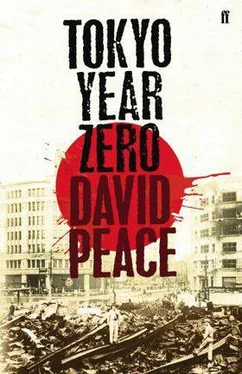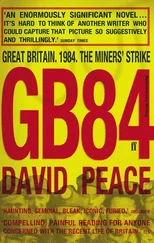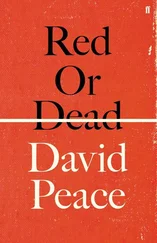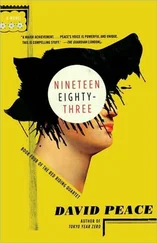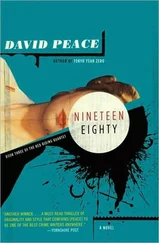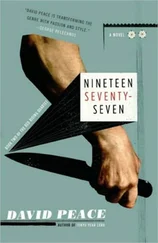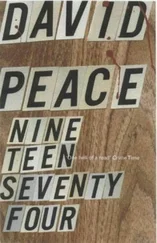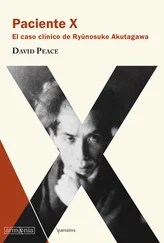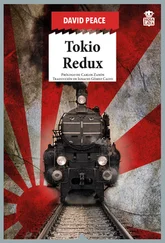I nod. I say, ‘But it makes no difference.’
*
I walk down the street to the Nakamura house but keep on past it and do not stop until I reach the corner. Then I stand there and I stare back at the house, the bad news I bring in the knapsack on my back. Now I turn and I walk back down the street towards the house. I stop in front of the latticed door to the entrance. I reach up to open it but it is locked and will not move. I knock on the doorframe but no one comes. I knock again, louder this time, calling out in apology –
‘Who’s there?’ asks Nakamura Mitsuko’s father.
‘Detective Minami,’ I say. ‘From the Metropolitan Police.’
I hear his slippers in the genkan . Then the door opens –
‘I am sorry to disturb you,’ I say. ‘But I have some news…’
Nakamura Mitsuko’s father does not ask me what kind of news I have brought them. Nakamura Mitsuko’s father does not ask my anything. He just nods once and invites me into their house –
These things I have brought. These things I will leave …
I feel sick as I take off my boots, nauseous as I follow Mitsuko’s father into the reception room at the front of the house, as I set down my army knapsack, as I sit down on the tatami across the low table from Mitsuko’s father, as I open the knapsack –
The pain I have brought. The pain I will leave …
I take out the rotten pair of brown monpe trousers. I take out the pale yellow blouse. Finally, I take out the elliptical-shaped ammonite brooch. I place each of the items on the table before him –
Nakamura Mitsuko’s father reaches out his hand –
I tell him about the skeleton in the woods …
Mitsuko’s father picks up the brooch –
I tell him about the cypress trees …
He brings the brooch to his chest –
I tell him where she is now …
He holds the brooch there –
How she’ll soon be home …
He bows his head –
‘She was my only daughter,’ he says. ‘Thank you.’
*
I sit down on a pile of broken concrete. I take out a cigarette. I light it. There is a row of barrack housing on the other side of the road. I watch a young woman hanging out a futon from one of the second-floor windows. I watch her beat the futon with a stick, dust coming off. Every now and again she turns to say something to someone inside the house. She says it with a smile or a song in her voice. But now the woman sees me watching her and quickly pulls the futon back inside the room and closes the window. I see her peep again at me from inside the room, a small child in her arms, her eyes filled with hate and fear. I want to ask her who she thinks she is to look at me with such contempt, such fear, to ask who raised her up to look down on me. But I look away from the window. I look down at my boots, my soldiers’ boots. There is the corpse of a pregnant collie dog lying on its back just a metre or so from my right boot. Its stomach has been split open by some other animal. Half-rotten but fully formed puppies have been dragged from out of her stomach and savaged, staining the soil and the stones a deep, dark and bloody red. Now I stand up. In the Year of the Dog, I sweep dirt and dust over the black dried fetuses with the side of my soldier’s boot –
Masaki, Banzai! Daddy, Banzai!
*
Ton-ton. Ton-ton. Ton-ton. Ton-ton. Ton-ton. Ton-ton. Ton-ton …
I walk through Kyōbashi Ward. I come to the battered board fence, the huge pile of rusty iron and the cabin with its glass door and tin roof. Behind the fence, two men in labourers’ clothes, one short and one tall, are carrying the small stool and the empty packing cases out of the cabin. I go through the opening in the boarding into the scrapyard. I say who I am and ask if Kobayashi Sōkichi is around –
In the sunlight and shadows, the white and the black …
‘Don’t you know?’ asks the tall one. ‘He died yesterday.’
‘Mr. Kobayashi is dead?’ I repeat. ‘How did he die?’
‘He was killed about eight o’clock last night,’ says the man. ‘He’d gone in his truck to pick up some scrap in Ōmiya and on the way back his truck turned over on a narrow bridge. Both Kobayashi and the other man who was with him were killed…’
‘I heard one of the Victors’ trucks ran them off the road,’ says the shorter man. ‘That they couldn’t get out of the way…’
‘You don’t know that,’ says the tall man. ‘It’s just gossip.’
‘No, it’s not,’ says the short one. ‘This old man who lives by the bridge, he saw the whole thing and made a statement to the police and he said that there was a convoy of four or five US army trucks heading for the bridge, which is just this old wooden bridge, that it is so narrow that it’s impossible for two vehicles to pass, and that the US army trucks were sounding their horns and flashing their lights but Kobayashi’s truck was almost on the bridge, so he couldn’t turn back but the US army trucks were coming too fast and so it looked to this old man like Kobayashi tried to pull over at the side of the bridge but that the first army truck that came across the bridge, it clipped Kobayashi and sent his truck rolling right down the banking…’
‘And he told all this to the Ōmiya police?’ I ask –
‘Yes,’ says the short man. ‘But the police said there was nothing they could do, not when it’s Shinchū Gun…’
I shake my head. I thank them for telling me the details of what happened. I ask if I might step inside the cabin for a moment –
They nod. ‘We’re just here to tidy things up.’
Now I step inside the cabin. The old colour postcard of the Itsuku-shima Shrine is still tacked to the wall. The potted sakaki tree sat on the butsudan before the three framed photographs; the three photographs and now one small candle burning on the shelf –
‘Perhaps he’s already just another ghost…’
Now I kneel down before the butsudan . I make my report –
To the three photographs and to the burning candle –
I tell them I have found justice for Hiroko –
I promise there will be vengeance.
I stand back up. I take the old colour postcard of the Itsuku-shima Shrine down from the wall. I turn it over. It’s from Hiroko –
A school trip in a happier time …
I put the postcard in the pocket of my jacket. I walk back out of the cabin, into the sunlight and the scrapyard, the two men still talking, the taller man saying, ‘You live through all that he lived through, you survive all that he survived, the war, the bombs, the fires, you survive all that just to die in a stupid traffic accident…’
‘It doesn’t make sense, does it?’ says the short one –
‘Except when your time comes, it comes…’
I thank them again and then I step back through the boarding and out into the street. I look at the buildings going up, the offices and the businesses, and I think about Kobayashi’s son, still chopping wood on the Amur River, not knowing his father died in a traffic accident at eight o’clock last night, not knowing his aunt died of a broken heart, not knowing his cousin was raped and murdered, not knowing he is better off dead, he’s better off dead, better off dead –
Ton-ton. Ton-ton. Ton-ton. Ton-ton. Ton-ton. Ton-ton …
*
I itch and I scratch. Gari-gari . I am hungry and I am starving. I need a drink and a cigarette. I itch and I scratch. Gari-gari . I walk through another makeshift market, through its stalls and its stands. I itch and I scratch. Gari-gari . I stop before a stall where a young woman is selling sweet potatoes. I stare at the potatoes and now at the woman –
Читать дальше
